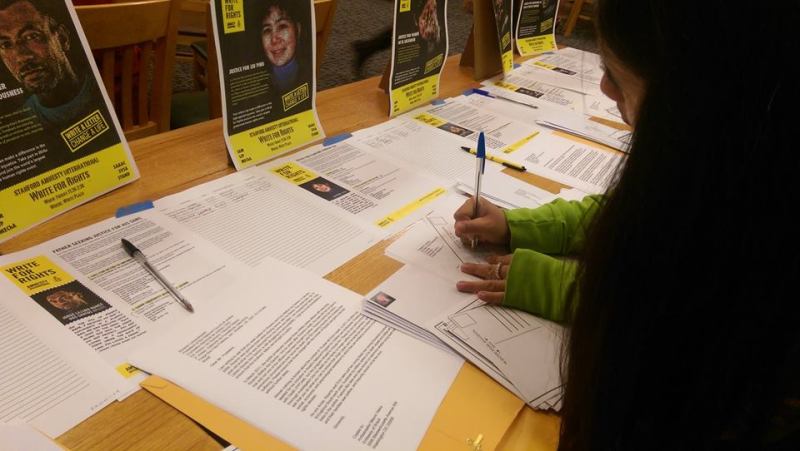
With the divestment movement pushing human rights into the campus spotlight, one organization has staked out a position firmly in the middle of the discussion.
During last Tuesday’s meeting of Stanford Amnesty International, a chapter of a worldwide organization that campaigns for human rights, the group discussed the role they want to take in Stanford’s potential divestment from companies profiting from the Israeli occupation of Palestine.
The debate made the meeting a little “frazzled”, said Emily Witt ‘15.
The group does not take an official stance on any divestment campaigns, so they had to come up with another way to engage with the conversation and advance their mission of raising awareness at Stanford of worldwide human rights issues.
“We were trying to put together some constructive way to contribute our human rights knowledge of the situation,” said Witt.
Members had varying ideas of how to do that. Some thought creating a space for open dialogue would be the best way to contribute, while others said that would not be the most effective way to address the issue.
In the end, Amnesty International members came up with a plan to put together an informational display of human rights violations on both sides of the conflict to give to the larger community, or at very least the ASSU, who will soon be voting on the issue.
Divestment wasn’t the only issue on the table. When choosing which human rights issues to engage with, the group takes its cue not only from campus climate, but also from Amnesty International’s worldwide campaigns and from the interests of individual members.
“We’re kind of a nonexclusive, all pro-human rights group and we’re kind of the only one at Stanford that has that label. Everyone else has a much narrower focus, and we have the ability to participate in the broader discussion of human rights in general,” said Witt, who has been involved with Amnesty since joining her high school’s chapter.
Right now, the group is planning an event on the Senate intelligence report released last December, which documents the C.I.A.’s program to detain and torture terrorism suspects in the years after 9/11.
To do this, the club is reaching out to other groups on campus and a handful of U.S. Senators to build a speaker panel that highlights the political aspects of torture, not just the physical and psychological aspects of torture.
Witt thinks people tend to be under one of two assumptions about torture.
On one side, says Witt, by believing torture is obviously unsupportable and therefore not worth discussing, you might never learn the details of the C.I.A.’s actions. On the other side, if you believe torture is acceptable when it gets results, you might never learn that the C.I.A.’s program did not get those results.
The group hopes the event will educate more people about the Senate report.
“Even in the larger outside-of-Stanford world it’s kind of faded from public consciousness,” said Witt. “We’re really trying to bring that back because it’s such an important issue that people don’t realize.”
Amnesty’s key form of activism, though, is letter-writing. Almost every week, the group writes an action letter to send to a head of state or policy leader.
“It allows us to focus on different [issues] even if we’re working on a bigger topic,” said Financial Officer Emily Taing ‘17.
This week’s missive was an appeal for Elena Klimova, a Russian journalist fined for ostensibly promoting homosexual behavior among youth through her website, Children 404, which supports LGBTI teens. The letter, addressed to a prosecutor in the region, asked for the end of Klimova’s prosecution and the repeal of the law against “homosexual propaganda.”
Amnesty also runs larger letter-writing campaigns. Last November they held Write for Rights, in which they set up camp in dining halls around campus, bringing with them copies of letters related to ten human rights issues for interested passersby to sign and mail.
“Not only are we having direct action by sending these letters, but we also are engaging in a very educational campaign and making people engaged in these issues,” said Co-President Matthew Rodman ’16.
This November, the Stanford Amnesty chapter mailed 300 letters.
Halfway through the school year, Amnesty is still recruiting. Last Tuesday’s meeting was the first for Isabel Leon Calle ’18.
She had always been interested in politics, but hadn’t tried out any related Stanford clubs till her roommate recommended Amnesty.
“I feel like they were being really real, and also very passionate about it,” she said. “It’s not just like, I have to do this to get an A…and I like that.”
Contact Abigail Schott-Rosenfield at aschott ‘at’ stanford.edu.
